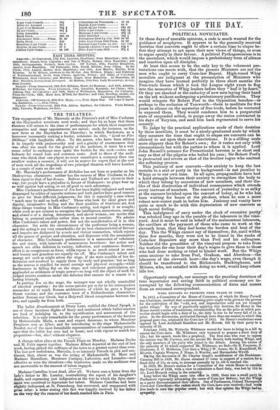THE THEATRES.
TEE engagements of Mr. Macready at the Princess's and of Miss Cushman at the Haymarket terminate next week; and then let us hope that these .theatres will return to the class of performances for which their respective companies and stage appointments are suited: such, for instance, as the new farce at the Haymarket on Thursday; in which Buckstone, as a borrower incessantly seeking a lender, reiterates its title, "Lend me Five Shillings," with laughable effect. To the actors, who have been stilting it in tragedy with praiseworthy zeal and a gravity of countenance that was often too much for the gravity of the audience, it must be a wel- come relief to exchange once again the buskin for the sock—robes and helmets for round hats and common coats. And to those of the audi- ence who think that one player no more constitutes a company than one swallow makes a summer, it will not be matter for regret that at the end of next week all the tragedians of two principal theatres will leave London in a couple of seats on the rail. Mr. Macready's performance of Richelieu has not been so popular as his Shaksperian characters; neither has the success of Miss Cushman in Ion 'been equal to that of her Romeo. Bulwer and Talfourd are clever in their way, but people have a prejudice in favour of Shakspere: no plays bear up 80 well against bad acting, or set off good to such advantage.
Miss Cushman's performance of Ion has been highly eulogized and much disparaged by critics of opposite notions; and both parties have good reasons to give for their different judgments: for this is especially a case where "much may be said on both sides." Those who look for ideal grace and dignity, imaginative feeling and the finer qualities of histrionic art, find these things wanting in Mies Cushman's acting, and regard it as nought; While such as are content to recognize the intelligence, earnestness, enemy, and abandin of a daring, determined, and c.lever woman, see merits that belong to personal exertion rather than to mental creation. We admire Miss Cushman's talent and power, but not the manifestation of it in this character. Set aside the circumstance of the performer being a woman, and the acting is not very remarkable; for its best characteristics of fervour and impulse are disfigured by a rude and violent mannerism, which rejects all the graces of gesture and elocution, and dispenses with the assumption of character. Miss Cushman's performance is a succession of vehement fits and starts, with intervals of monotonous heaviness: her action and speech are alike deficient in variety, inflection, and continuous fluency: effort is as conspicuous as force, while repose is as much missed as ease; and beauty and grandeur are equally far off. Miss Cushman's talent and energy are such as might adorn the stage, if she were sensible of her de- ficiencies and resolved to supply them by study and practice: but so long as the actress is extolled for moral courage and physical strength—while fearlessness in falling flat on the stage, and vehement gesticulation, are applauded as evidences of tragic power—so long will the object of such ill- judged praises continue under the delusion that success for a season is a lasting triumph. In putting Ion on the stage, the manager was not wholly unmindful of classical propriety: for the scene-painter got so far in his retrospective researches as to reach Roman architecture, of which he gave a Regent Street version; and the costumes were of a Richardsonian character— neither Roman nor Greek, but a Holywell Street compromise between the two, and equally far from both.


























 Previous page
Previous page